|
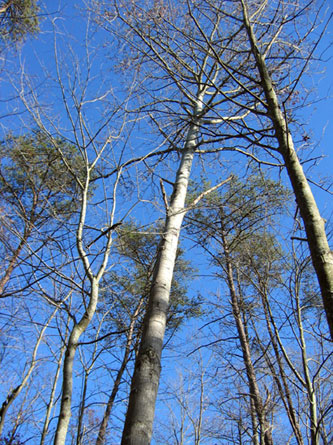
Quaking aspen, Populus tremuloides. Rowan Co., KY.
(*photo
credit)
February 1,
2010 Proclaim Salvation For All
Two
months ago in Copenhagen the challenge was placed by the poor
nations; if we are to save this world we must all be willing to
share in a radical manner. Response was mixed but the one hundred
billion dollars per year in 2020 was a good beginning. What we are
all coming to through kicking and screaming is that "Salvation is
for all, not just the privileged." However to understand and
champion this universal outlook is itself a privilege of grace.
They say
"hindsight" is an exact science. We do look to history of both
longer- and shorter term, for possibilities as how to act now. The
Lord has given us a glimpse as to what lies just beyond the horizon,
but to reach that goal up ahead involves taking risks. In Luke
4:21-30, Jesus' message turns an astonished hometown audience into
an enraged one. We might wonder why people so suddenly wanted to
kill him. Jesus does not cater to the hometown audience as though
they are privileged to dictate how to act or what to say.
Jesus
goes out to people everywhere, for all enter his arena of love. For
selfish people, thinking globally is to diminish local privilege.
Jesus speaks directly to the heart of the matter; he never minces
words; his heart goes out to people in distant places well beyond
the area his immediate ministry -- which is beyond his hometown.
Does saving all mean sharing limited resources with people
throughout the world? Yes, all are to be saved, not just our own
folks. Increasingly, in recent world conferences, differences in
rich/poor viewpoints have become more pronounced. Do we preserve
high consumption rates among a few, or do we share health, food and
other benefits with the great masses?
Just as it
was risky for Jesus to deliver his message two thousand years ago,
so a prophetic voice calling for the saving of all is a risky
message today. Silence is not golden under such circumstances. One
must share, and that means turning luxuries into essentials for
others in Africa. We are anointed by the oils of Baptism to be a
prophetic people, and that means we should not remain silent. To
be true is to speak, even when what is spoken is not well received
or even provokes violent responses.
People in
local communities and parishes are asked to share radically with
others. One parish in Tennessee changed its building program and
assisted a poor parish in Haiti. Some individuals curb their food
budgets in order to share with people in India. In speaking of a
prophetic outward vision, one must challenge those who hear or read
these words. Where is the need the greatest? Are people hungry for
Christ in our local county or community? How do we go out to all
the world except through this radical sharing with them from our
surpluses?
Prayer: Lord teach us to proclaim the need to share radically
with our neighbor and to encourage others to do the same.

A candle to set the dark night aglow.
(*photo
credit)
February 2, 2010 Candles and Other Energy Sources
Each year
on Candlemas Day we are carried back to the rich tradition of
using candles for special events and seasons: birthday candles,
altar candles, candles at Baptism, Advent candles, blessed candles
lit during storms, dinner candles, candelabras, Christmas wreath
candles, and on and on. We realize that the light of a candle
(candle power) is quite small, and yet this flame has been
satisfactory as a source of light for generations of our
ancestors. Along with the various types of candles are a host of
associated emotions: commitment, anticipation, protection,
conviviality, solemnity, and intimacy to name but a few. Candles
when lit symbolize enlightenment in a special way. "Light a candle;
don't curse the darkness." Enlightenment gives us direction on our
way and light by which to read. Although candles are a weak source
of illumination, they are strong symbols of how we ought to act.
However, candles have some inherent weaknesses that we ought to
recall:
Candles
are expensive. Conservative candle users limit the time in
which they allow them to burn. In former times, the differences in
the ordinary monetary offering for a "low" Mass (two candles) and
that of a "high" Mass (six candles) were partly based on candle
costs. Remember blessed candles used in such services were made
from beeswax -- and that can be expensive. So are modern sources of
energy costly, especially if we are to choose nuclear power
operations at price tags of six billion dollars and rising per
powerplant, along with uncalculated additional environmental costs.
"Clean" coal demands more and more taxpayer money as well.
Candles
are dangerous. One cringes to think that the Swedish girls
would wear rings of lit candles on St. Lucy's Day, or Germanic folks
may light candles at the Christmas tree (heavens forbid). All too
often candles have been left burning after a meal or services, with
some drastic results. Thus certain energy sources are dangerous,
even when forgetting the dangers to the environment associated with
fossil or nuclear fuel sources.
Candles
are temperamental. I recall the process of the unsteady hand
(my own) attempting to light or extinguish candles at the high altar
using a taper-holding device. Candles can easily topple or drip or
fail to catch, or their wick can get buried in the molten wax;
sometimes they cease burning or fail to start. In much the same
way, many renewable sources of energy seem perfect from a distance,
and then the clouds block the sun and the winds cease blowing when
energy is needed. Energy production can be challenging even from
renewable energy sources.
Candles
are finite. They can give only so much light. All energy
sources are finite whether in the materials and finances needed to
install or in the resulting useful energy produced.
Prayer:
Lord, as the light of day extends, help us to bless the light You
give us to help find our way in the world.
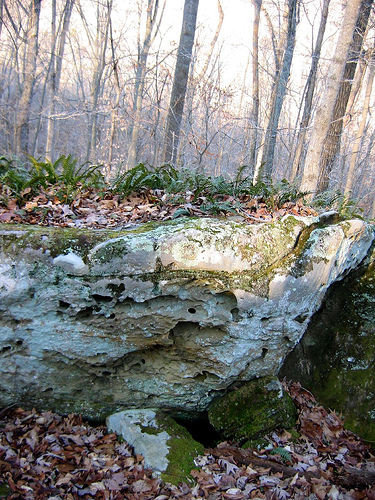
Earth's magnificence. Corbin sandstone
boulder as substrate
for life. Carter Co., KY.
(*photo
credit)
February 3,
2010 Take and Receive Abundant Blessings
Through
the intercession of Saint Blaise, bishop and martyr, may God
deliver you from every disease of the throat and from every other
illness, in the name of the Father, and of the Son, and of the Holy
Spirit. Amen. (Blessing on St. Blaise's Day)
Once a
year we ask a special protection for our continued good health,
realizing that we are always subject to mishaps and illnesses that
afflict human life in general. Seeking protection through the
intercession of the saints is an age-old communal exercise, but
more; we place ourselves within God's familial embrace and realize
that many blessings are always forthcoming.
Today we
use a blessing of St. Blaise who was a fourth century Armenian
bishop, but little is known about his life. Legend has it that
Blaise saved the life of a boy with a fish bone stuck in his throat,
the son of a woman who brought food and candles to him while he was
imprisoned for his faith. That gesture of good will extends to us
today.
Why is
this the most popular blessing in this country and in many Christian
communities worldwide? Part of this is due to the deep-seated
practice that goes back to the eighth century. People have always
had a fear of sudden diseases and life-threatening accidents that
can occur either to themselves or others when they least expect
them. Choking from food is always a great fear, for we know of
cases in restaurants and hear how people save others from death
through quick action. We desire protection from such accidents --
and from such diseases as H1N1 flu that could strike with dramatic
suddenness. Calling on the saints can be a public sign of the
constant need for divine providence and heavenly assistance. St.
Blaise's Day is celebrated by the Russian Orthodox on February
11th.
Rather
than hoping that this blessing goes by the wayside of "progress," it
may be better that blessings be extended to others. One person, a
Baptist, observed that a female Catholic soldier always blesses the
Humvees in Iraq. Someone asked him why he awaited her blessing. He
said that he noted that all the blessed vehicles returned, and he
knew a good thing when he saw it. Certainly, that answer borders on
the superstitious, but it also includes the acknowledgment that
blessings help us all find the divine Providence so necessary for
ordinary daily living. The world would be a better place if more
blessings were asked and more given. We are part of a needy family
that could use the spiritual and moral support of others, especially
those who have accomplished the journey of life and are crowned with
victory.
Prayer:
Lord, we seek your special protection, especially in times of
epidemics and troubles. Guard us and help us to do your will. Give
us good companions to help us on our journey of life, and open our
eyes to look out for blessings given and opportunities to give
blessings in return.

February 4,
2010 Obtain "Tobacco Days: A Personal Journey"
Most
books take a long time in formation. In 2002, when completing my
directorship of public interest groups after thirty- two years, I
considered a project to examine how my family was engaged in wars of
the past two centuries, and thus I conceived of a trilogy that would
involve war memories of the Civil War and Second World War, the
Franco-Prussian War (1870) and the "Tobacco Wars" of the early
twentieth century in our part of Kentucky. Through research during
my sabbatical I prepared two essays on the first events. However, I
became increasingly puzzled by my family's participation in the
Tobacco Wars in and near our home county. In fact, the failure to
surface specifics about the domestic squabbles (everyone remained
silent) caused me to turn my attention to the concept of tobacco
itself. How did this beautiful and yet mesmerizing plant enthrall
and overwhelm our family and neighbors in a mere lifetime? And this
story included all for better (economic) and worse (health
deterioration and death to certain individuals) aspects of the
tobacco culture.
As the
facts began to reveal themselves, it was painfully apparent that my
gradual change of attitude took place over eight decades and that
each of these spans of time triggered a difference in outlook. I
moved from seeing tobacco as an unqualified good, through realizing
the damage misuse can do, to a more neutral view that the substance
can be a good as teacher and, if alternative uses occur soon, as a
healer. In addition, tobacco use as a lesson on deliberate
corporate misuse is something much needed by a consumption-ridden
culture like ours; furthermore our tobacco story needs to be shared
with other people who are going through their uncritical love affair
with tobacco use. Millions die each year and the numbers are rising
at an alarming rate.
Tobacco
Days is a gentle story of someone spared by the unhealthy
effects long enough to lay a case out to others. This applies to
those who are in health policy, administration and care, and to
those who want a loved one to break an addiction, which can harm
both the smoker and nearby relatives and associates. The purpose of
the book is often more serious than the rather humorous manner in
which the story unfolds, but sometimes when we chuckle we are
striving to prove a point: Stop current tobacco use. All the while,
my admiration for the tobacco plant is undiminished. Beyond my
lifetime, tobacco could be a source of protein for a hungry world.
Tobacco can be redeemed -- and that makes this work theological as
well as scientific, political, economic and social.
The book
is being published by Brassica Books. Details on how to
obtain a copy are given in the Publications
section of this website.
Prayer:
Lord, help us to get this book into the hands of a few who are
smoking themselves to death. If only a few can be encouraged to
change from this practice we will have achieved something.
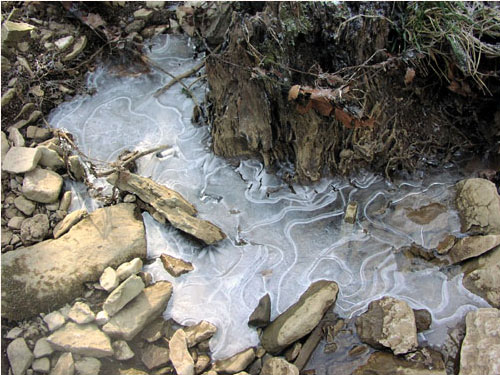
Ice of a small stream. Franklin
Co., KY.
(*photo
credit)
February 5,
2010 Realize That Weather is Important
On
Weatherman's Day, let's consider that each of us is to be a
"weatherperson," not just certain gifted or tv-friendly and
presentable individuals. On venturing outside we want to know
exactly what is happening today weatherwise. Will winter let up
today? Are there any new signs of spring? We may return and check
the weather maps on the Internet, television or newspaper; we
listen to weather reports when planning trips. If a storm front is
coming, we prepare for it, or postpone the travel for safety's
sake. With each passing year, weather maps are more accurate, as
meteorological science becomes more sophisticated. The maps can
tell us the patterns of the next few days with reasonable accuracy
-- and we tend to pay attention before confronting the "elements."
Some of
us experience mood changes when the barometer takes a sudden dip --
and with time learn that our important life decisions must take
weather into account. We weather-sensitive people should not decide
matters when the barometer is low or changing --- and maybe some
ought to refrain from decisions when temperatures are too low or
high (this century has already had record high summers). Know
exactly what the environmental conditions are when we choose certain
life-altering actions. Most of the time I must go out of doors each
morning just to get a "feel" as to what the day is to be like (yes,
my outdoors inspection says it will snow today as this is being
written), Farmers make daily decisions for planting and harvesting
based on the immediate weather conditions.
I doubt
whether the home-bound or those working from their place of
residence are as interested in weather as those who must go outdoors
to work or travel or play. Even the home-bound must go to the
doctor or other places and want to know about road conditions. The
weather enters into our scheduling of events. What if that rare trip
is slated for next weekend but a major storm is expected -- and
cancellations and delays could be reasonably expected? Think
ahead; we can't change the weather, but we can change our
weather-dependent activities. In the past, the word "journey" had
involved a hardship component, and this has never completely
disappeared, even though travel is more comfortable than in times of
stagecoaches and sailing ships.
Longer
term weather predictions as to how cold the rest of winter will be
or how hot we may anticipate this coming summer being are somewhat
problematic -- even for the professional forecaster. Those who
guess by wooly worm color or the thickness of animal coats or
groundhog shadows are right about half the time -- as are the rest
of us. We need not know that much about the future even though
climate change seems here to stay and affects us deeply. Tomorrow
will bring weather that we must prepare for.
Prayer:
Lord, teach us to be observant to the signs of the heavens as
Jesus tells us; help us to know what is coming and to realize that
this influences the way we act here and now.
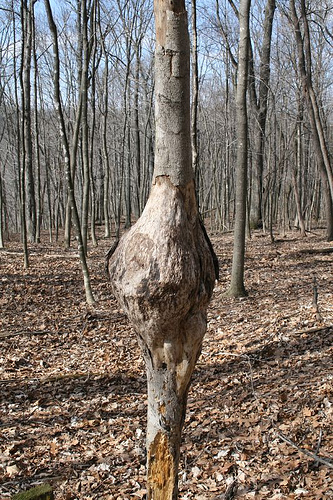
Tree gall against winter landscape.
Clyde E. Buckley Wildlife Sanctuary.
(*photo
credit)
February 6,
2010 Consider Lenten Diet Changes
Lent is a
perfect time to change our ways. Each of us should consider our
current eating habits, some of which could be moderated according to
the threefold legs of good diet: nutritious, low-cost, and
locally-grown foods:
1. Grow
your own fresh salad vegetables this year. During this non-growing
part of the year I have enjoyed homegrown kale, mustard, collards,
radish tops, turnips, carrots, garlic and spinach. These veggies
replace costly store-purchases, are local and are highly
nutritious. Consider growing them throughout the year using
protective cover and add others that grow well in your
micro-climate.
2. Omit
soft drinks and go to water, fruit or vegetable juice, herbal drinks
or even coffee and tea. Soft drinks are expensive, contain
excessive levels of refined sugar, and generally are supplied from
distant bottling plants with no responsibility attached for picking
up and reusing the containers.
3. Use
locally-grown herbs for spicing. This is low cost and saves on the
purchase of salad dressing and various seasonings;
4.
Prepare steamed veggies (cabbage, carrots or turnips) for breakfast
using Quick Eggs (fat and cholesterol free and low calorie)
along with a sprinkling of oatmeal. Local free-ranging chickens are
a fine source of eggs, but eat eggs sparingly.
5. Choose
snack foods wisely. These are part of the diet of people who prefer
to eat at irregular and frequent times. Fruit, carrots and celery
are good snacks along with nuts of various types. Salty and fatty
chips are to be avoided. Unsalted popcorn flavored with garlic and
chili powder is a special treat.
6.
Prepare a different soup each day and use leftovers as part of the
creative mix. See "Special Issues" on this website.
7. Eat
belly fillers; one example is to eat a quarter of a strong onion
along with cottage cheese at one of the meals.
8. Limit
intake of bread, crackers and other carbos to a reasonable degree --
one or two slices per day. Limit pasta dishes and pancakes to
weekly or a few times a month.
9. If you
are not vegetarian, at least watch and reduce the meat intake.
Locally-obtained venison is highly nutritious and comes at lower
cost than expensive, distantly-grown beef or chicken.
10.
Rearrange daily food intake. Make breakfast ample and the supper
sparing, and eat increasingly smaller meals in between.
Prayer:
Lord, teach us to be watchful not only in prayer but in the things
we eat as well.
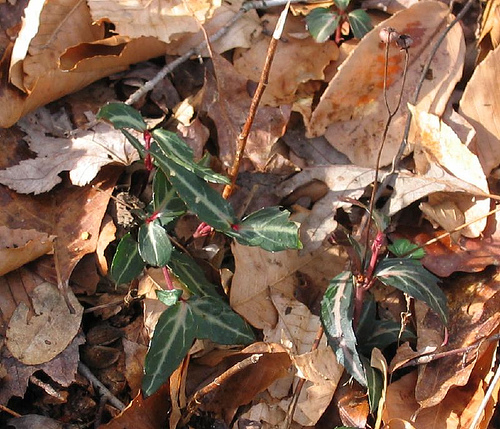
Color amidst winter forest floor. Pipsissewa,
Chimaphila maculata.
(*photo
credit)
February 7,
2010 Be Willing to Do the Lord's Work
Here I
am! Send me. (Isaiah 6:1-8)
God sends
us as messengers of Good News and yet some do not listen through the
noise all about them; some excuse themselves for lack of hearing or
a false humility; and still some seek to escape the responsibilities
directed at them and direct their attention to other business,
allurements and distractions. However, the Lord calls and
perceiving this becomes our critical moment. Granted, we are
unworthy, we recognize our escape mechanisms, and we realize that
the time is short.
In the
stillness of winter when the snow falls, dampens outside noises and
forces us to stay put, we have a precious moment to stand before God
as Isaiah's moment of grace appears. If we are people who thank God
in a spirit of ongoing gratitude, we find the gifts given deserve a
recognition that goes beyond mere words; the call is to specific
responsible deeds whether these be caregiving to others, fulfilling
our current ministry, moving to other fields of service, or
allotting free time for the benefit of our fellow human beings in
need. God is powerful and willing to share power with us; we must
be willing to see the deeds we can perform as powerful God-given
instruments of change.
God
calls, gives us the grace to respond, and helps launch us into the
deep of those in great need. Even amid difficulties and risks we
are willing to say with Isaiah, "Here I am." Unless this is a very
special call, I cannot abandon my present locality and move to
distant places. However, the call is to be totally dedicated.
Jesus calls disciples at the Lake of Galilee; his apostolic call is
for them to leave everything and follow him, even to go to distant
places. We also receive God's call. "Here" includes
Calvary-made-present in our world, an entry into the sacred divine
moment, NOW, and space, HERE.
The task
ahead is daunting. Jesus says, "Put into the deep water and lower
your nets for the catch" (Luke 5:4b). The risk of failure is always
present. However, God, who has given us all good gifts, will shower
us with the tools to undertake the tasks ahead -- if we but truly
trust in divine assistance. By saying "present" to God's unique
calling, we launch into the deep and open ourselves to make Christ
present to others. But launching involves risk and vulnerability on
the turbulent sea of life. Our forebears decided to move out of
their home security to a new life. In following the Lord, we see
the fruits of our labor as being from God and that success depends
on working with the Lord at this time.
Prayer:
Lord, teach us to leave the comfort and safety of our supposed
securities, our couch, our nest, our inner room, and move out into
the harsher and more uncertain depths. Help each of us to say "Here
I am! Take me as I am," and to do so eagerly and with enthusiasm.
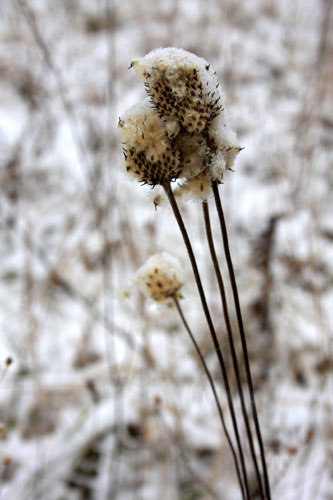
Thimbleweed, Anemone virginiana.
(*photo
credit)
February 8, 2010
Are We Willing to Accept Regulations?
The Economist puts
more faith in business than most. Yet even the stolidest defenders of
capitalism would, by and large, agree that its tendency to form cartels, shuffle
off the cost of pollution and collapse under the weight of its own financial
inventiveness, needs to be constrained by laws designed to channel its energy to
the general good. Business needs governing just as science does. (The
Economist 12/19/09 p. 38)
Healing involves
knowing the cause and seriousness of an illness, remaining in isolation to avoid
harming others, and taking measures needed for healing. We cannot expect
miracles to cure what we have caused through deliberate neglect or
thoughtlessness. We are not to pollute air through some sort of "right to
pollute" and then expect God to right the wrong we have done or are continuing
to do. Knowledge of wrongdoing includes realizing the harm, begging
forgiveness, and taking corrections.
Wrongdoing towards
our wounded Earth includes: pollution of air and water, excessive emission of
carbon dioxide, salination and erosion of fertile land, and toxic contamination
of land through use of pesticides and industrial chemicals. Glaciers are
melting; oceans are expected to rise and storms to increase. We assure
ourselves that technical remedial measures exist and that we (the affluent) can
evacuate to higher grounds and build higher sea walls (all costing billions of
dollars).
Some may suggest
paying for added climate change expenses through a tax on the savings that
shipping companies make by using the shortcut of an ice-free Northwest Passage.
Far-fetched? However, climate change realistically could be reduced through
some practical measures suggested at the recent Copenhagen Conference: renewable
energy and efficiency measures; transparency in programs to cut pollution; and
giving a value to forests, thereby compensating poorer nations for reducing and
eliminating deforestation (currently causing 20% of climate change emissions).
However, few openly question a consumption-based economy that is the root cause
of these environmental problems.
Do citizens
(especially affluent ones) have the will to change? Certainly some people want
to simplify their lives, and want to spread the message of energy efficiency and
to replace fossil fuels with renewable energy sources. However, the critical
question is: what about the vast majority? What about Chinese, Indians and
others who want cars, spacious homes, electrical appliances, and more meat and
processed foods? What if two billion more want to be like Americans? Yes,
measures by individuals are beneficial, but not enough. Doesn't a free society
demand a radical sharing of responsibilities?. Are we willing to join with
others and do this? Will we accept increased regulations?
Prayer: Lord
teach us to act as a community and curb the excesses that harm our
Earth, and take the needed remedial steps.
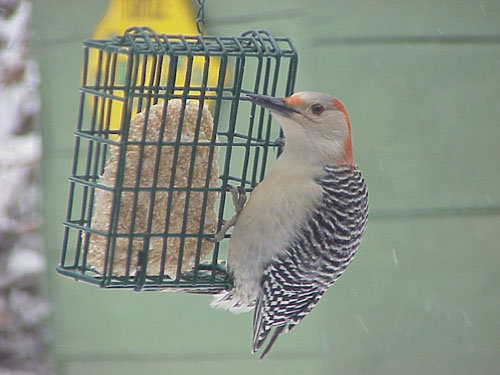
A red-bellied woodpecker, Melanerpes carolinus.
(*photo by Sally Ramsdell)
February 9, 2010
Demand Proper Financial Regulations
Our economy is
connected with our environment; to expect those of us engaged in seeking to heal
our wounded Earth to refrain from being critical of the economic system that
encourages wasteful consumption is erroneous. Citizens can and must regulate
and reconstruct the economic system in which they must live and thrive. The
question is not one of patchwork regulations for a corrupt system involving
banks and financial institutions outside the law; regulations ought to be
directed to confronting economic illness with authentic healing. Some desired
regulations include:
Break up the
banks: The old economic ways are simply not good enough: "Too big to fail"
is failure; the truth is "Failed when too big." Small is more than beautiful;
it is far more practical in economic terms. Big banks are unhealthy and damage
our democracy. Limit the size to which banks can grow.
Limit financial
activities: No federally insured banks or institutions should be allowed to
engage in reckless speculation. In reply to the argument
that there will always be speculation (and other forms of gambling), the answer
is that speculation can be strictly regulated if not abolished so that all will
be unharmed.
Limit pay levels:
Why should some in this world have a "right to wealth" when others do not have
enough to live on? Every effort should be made on the part of government to
avoid bonuses for ALL, for there are other more healthy incentives for
doing one's work. People should be able to make higher salaries; they simply
should not be allowed to keep them.
Prohibit
derivatives and exotic financial instruments that are not related to the
common good and defy normal regulation. Why can such economic game play even be
allowed in a rational society where many are not properly fed, sheltered,
educated and provided with access to health care?
Tax the Rich:
Why should the tax burden be on lower income citizens? In Kentucky (and
elsewhere) the highest income one percent pay the smallest proportion of taxes.
Certainly a speculation tax called for by some is only a start. Most can live
well on $100,000; the remainder should be taxed for the needy.
Jail the tax
cheats and those who slip immense sums of money to overseas tax havens.
Apply sanctions to the nations that are tax havens and encourage such illegal
transactions.
The first few ideas
are provided in an editorial by Robert Weissman in Public
Citizen News, November/December, 2009, p. 3.
Prayer: Lord,
we are overcome by a holy anger over what has occurred in our land during the
last two years. Help us not to be blinded but through proper legislative action
to change a system that has threatened to
destroy our democracy.
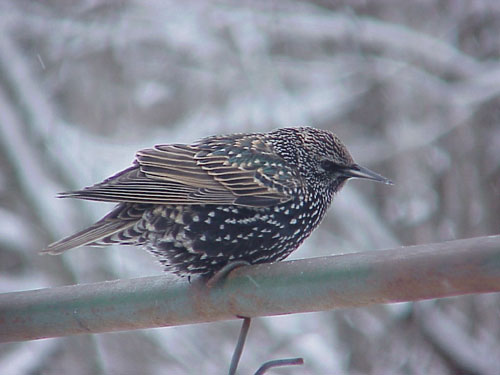
Starling, Sturnus vulgaris.
(*photo by Sally Ramsdell)
February 10, 2010
May We Hear the Cry of the Poor
Happy those who
hunger and thirst for what is right;
they shall
be satisfied. (Matthew 5:6)
Is it safer to be
silent about our discontent, or ought we to begin to spell out our feelings in a
special way? Our discontent involves both the current "free market" economy
and the gurus who promote it and intimidate us to be silent about the system's
weaknesses (joblessness, undervalued resources, greed, unjust tax patterns).
Since we can change the world faster and more profoundly through blessings than
through curses, let us attempt a positive spin on what lies ahead -- not cursing
the possible darkness that could envelop this world. Here are positive elements
that are emerging:
The poor will rise.
The less-wealthy nations are realizing power in uniting and in rejecting the
colonial "divide and conquer" approach of past ages. In union is strength.
Demanding financial support in times of global climate change is simply asking
those who sinned through wastefulness to pay for what went wrong -- the
temporary effects of sin and wrongdoing. The demand that they are not to
continue in their sin but to make recompense for the after- effects of
wrongdoing in the past is a Christian and just demand.
Affluence is
exposed as impoverishing. This impoverishment works in several ways.
Excessive wealth used for consumer goods impoverishes our Earth by excessive
draining of resources that are needed for meeting the essential demands of the
poor; affluence impoverishes the spiritual aspects of individuals by turning
them into materialists; and affluence makes practitioners selfish and
insensitive to the needs of others; lastly, affluence is an inherently bad
example for those aspiring to be wealthy.
Changes will come
quickly. A world of rapid communication has a way of hastening the demand
for justice; the Internet is catalytic. What is lacking among so many cannot
go unnoticed with television cameras and microphones. People cry and we are to
hear the cry of the poor for we are Christ's ears. We must challenge social
acquiescence or a consent without protest. Injustice in all its forms needs to
come to light so that, with a pure heart, justice can be distributed to all who
are in need.
Just taxes are
required. In Kentucky, the top wealthy one percent has the lowest tax rates
in our commonwealth; many of our taxes are quite regressive and affect the poor
in the hardest way -- and our state is not alone. Not only are current tax
systems unjust, they impoverish all by cutting educational, health and public
service benefits. "No new taxes" is a propaganda slogan generated by those who
ought to pay their fair share.
Prayer: Oh
God, Source of all justice, inflame our hearts so that they may not rest until
they rest in You. Help us never to be satisfied until justice comes upon our
world.
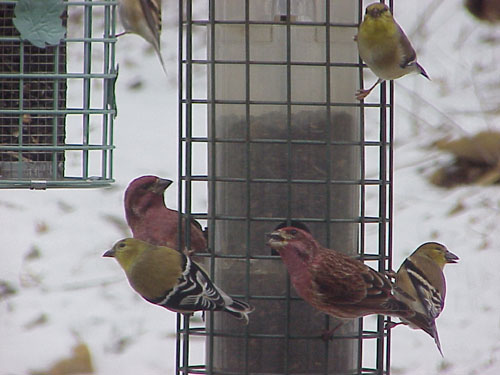
Finches enjoying the blessings of a
winter birdfeeder.
(*photo by Sally Ramsdell)
February 11, 2010
Give Thanks for February's Blessings
If finding a dozen
things to be thankful for in January seemed to be a challenge, what about in
February? However, here are a few that may tap your own creative wellsprings:
* A Lenten time
to reflect and meditate with fewer distractions;
* Lengthening
daylight, becoming ever more noticeable with each passing day;
* The dawn's
color with its sweeps of gray and blue. Sometimes the red streaks enter and
tell us of the weather changes ahead;
* Poetic
inspiration that seems to be better suited for this month, maybe because its
shortness makes us aware how passing our own mortal lives are -- and how much more we must do today;
* The birthdays
of great people born in this month, all of which could deserve some special
remembering;
* The aroma of
wood smoke from the neighboring residences that still burn a renewable
resource for heating and cooking;
* The sound of the
mourning dove that gives a sense of reunion with the great outdoors and the
need for new life;
* The sight of
the first robins as they move about the lawn and seem to be shivering
from the cold;
* The warm
indoors that makes us comfortable and sheltered form the sharp external
breezes.
* The first
outdoor work opportunity on a sunny day. Things come to mind such as
initial spading of the garden plot, planting of the first peas, gathering of
fallen tree branches, and grounds' clean-up that was not completed in the
autumn;
* The vigor of
basketball games of all sorts being played or observed, or the other indoor
sports such as racquetball and squash; and
* The early
flowers -- snowdrops, crocuses, and forsythia bushes (add, in addition, the
brave dandelions that give needed color to the raw landscape).
Prayer: Lord help us
during this holy season of Lent to always rejoice and give thanks, even when
this seems to be a challenge. It is far easier to beg than to thank You for
gifts already given, but help us do both.
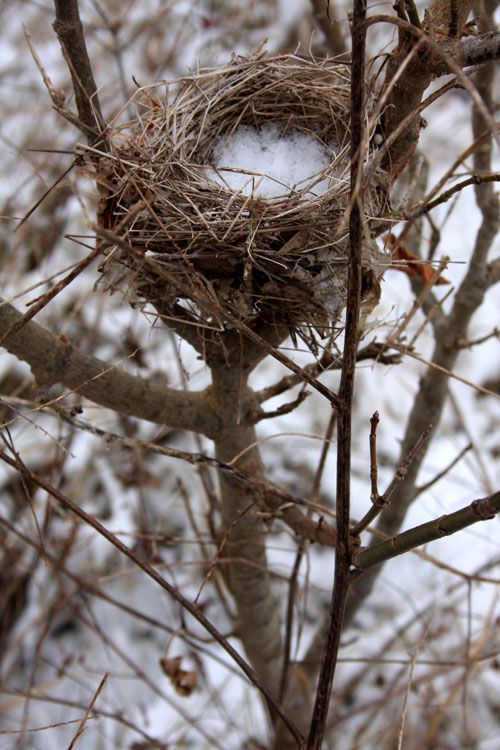
A nest in February, freshly-filled with
snow.
(*photo
credit)
February 12, 2010
ODE TO THE FEBRUARY-BORN
When winter
extends itself in frosty clime,
and spring
won't come, nor poems rhyme.
Such is the
shortest month sublime,
but longest,
by far, in psychic time.
Sing out winter's
final dirge,
Fault the
neighbor's mall-led splurge..
Exercising urge,
fasting purge,
Greenhouse
starts, when spirits surge.
A birthday rite,
a feast of light,
When days get
longer, an hour less night.
Hear the mourning
dove, bird-starved delight.
Listen! the
tree sap's finding height.
Pouring molasses
in January's a chore,
but molasses
in February is still slower.
Winter, winter,
may it ebb away?
Modest
delay, oh fibbing February!
And deep down
when I think this month's a crime
I find the
finest born came at this time.
There's George,
Tom Edison and Honest Abe,
and many
years ago, Paul Rothkrug, a babe.*
God made the
February-born doubly great,
for these
learned early to smile and wait,
To defer to those
who come by late,
to stand for
justice in place of hate.
* Dedicated
to the late Paul Rothkrug on his birthday, though it could just as easily apply
to other February-born.
Prayer: Let
us find every month an ideal time for something, and make the best of what we
have with each opportunity. There is a time to be born and a time to die, and
let us be comfortable with the times that avail themselves for important
happenings.
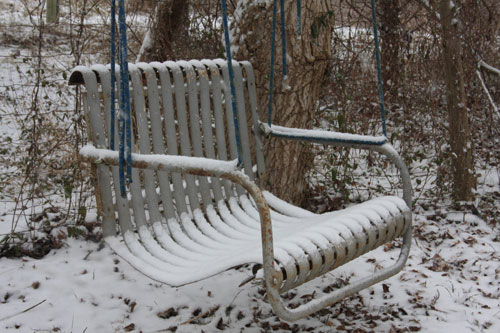
Tree swing covered in snow.
(*photo
credit)
February 13, 2010
Protest Acquiescence
You are the ones
who destroy the vineyard and conceal what you have stolen from the poor. By
what right do you crush my people and grind the faces of the poor?? (Isaiah
14b-15a)
Injustice abounds in
our world. What do we do? If injustice is against me as a person, the Spirit
may direct me to silence; if against another, we must protest in every way we
can. Even Mary, the other women and John protested by standing beneath the
cross; the other apostles in all their bravado and posturing ran and hid; the
women were the protestors; the apostles the fearful ones.
Permit me to repeat a
previously told story (February 10, 2007) of once attending a global
consciousness-raising game play: ninety percent of the audience were given a
simple rice meal and ten percent a steak-and-gravy feast. We ninety percenters
were to reflect as though we were the poor. So what did I do? Why the only
Christian thing: I organized part of the majority and went over and seized the
steak dishes and divided them equally; thus none would have too much and "pig
out," and none were to go home somewhat hungry. Some other players (the
privileged ones) complained that we spoiled the event. I protested that we
made it a success. Why should we tolerate such differences and remain politely
silent while others hurt themselves by overindulging?
Protesting injustice
is needed if we are to rid this world of the many obvious injustices: lack of
food and essential human needs; overly wasteful affluence; the privileged going
undertaxed; and a rampant militarism. Yes, all too often we persist in acting
out the part of passive observers of events as though they are inevitable. We
are silent with a deafening silence, for if we say something we might be
declared out of order. Looking at Isaiah's words we ask whether it is we
who destroy world resources and conceal this from the poor? If we allow such
conditions without protest we are the ones who are party to the injustice.
A misdirected
scriptural passage relates to Jesus' saying the poor will always be with us.
Taken out of context this is made to justify ongoing poverty. However, our
failure to address this persistent poverty means that we will be challenged over
and over -- and this means the problem will stay with us until solved. The
possibility that all injustice will not be eliminated does not stop us from
taking the positive steps needed at a given time. Even with all the work ahead,
we must protest injustice with all our limited strength. In and through
protest, we affirm the need for improvement in time -- and are willing to work
for it, not to be complacent about the status quo.
Prayer: Lord,
teach us not to fear standing beneath the cross of injustice, and to show by our
public stance that we are with those who suffer with Christ. When we can help
remove that cross, give us the energy and
courage to do so.
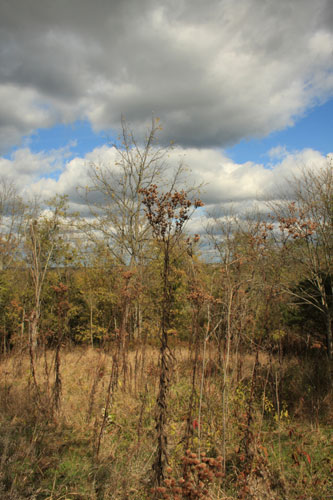
Remnants of summer against a wintery
sky.
(*photo
credit)
February 14, 2010
Blessed Are the Poor
Blessed are you
who are poor, for the kingdom of God is yours.
Blessed are you who are
now hungry, for you will be satisfied.
(Luke 6:20-21)
In this Year of St.
Luke's Gospel, note how often the poor are mentioned: the infancy narratives,
temptation of Jesus, Good Samaritan, Lazarus and the rich man, hard saying to
pharisees and others, and even Jesus' initial proclamation of his mission to his
home town audience; the refrain continues throughout and even through Luke's
companion volume the Acts of the Apostles.
Homily-givers,
especially on Valentine's Day, are tempted to say what is pleasing and
soothing. "Why bite the hand that feeds you?" Is the homily meant to increase
our popularity, or does spiritual leadership demand more? We can deny our
privileges, excuse ourselves as doing some things with the poor, or simply
escape to other issues. But face it: we are privileged with special gifts:
national security, good roads, health care systems, educational facilities, a
secure food system, adequate potable water, instant communications systems, and
on and on. As privileged with many gifts, we must see gifts as serious
responsibilities, opportunities to share, and as resources to respect and use
properly. But this is not enough for a homily.
How can those who
suffer so much be blessed? First, sufferers often have a sense of gratitude for
the simple gifts given; the poor are often more receptive to seeing that they
could have been overlooked and yet are somehow remembered. Some sufferers do
not have such a grace of insight, and yet intuitively they know that comfort
awaits them in a blessed future. . Blessed is the one who trusts in the Lord,
whose hope is the Lord (Jeremiah 17:5-8). While the poor often include
imperfect people who are conniving, subservient, deceitful and even greedy,
still a sizeable number are trusting in God, for how else can they survive?
They can understand a spiritual blessing, while others more or less fortunate
rely on seeking comfort in real or imagined material goods. And the more
materials possessed, the tighter the grip the average possessor holds on his or
her material things.
Do we seek to
encourage the wealthy to give up what they regard as theirs and allow this to
become a double blessing? On the level of "should" one must say that when a
person becomes convinced that the resources do not belong to him or her alone
but to the commons, the moral imperative to liberate the rich of possessions is
present. Give it up freely and generously. Such a recognition of improper
ownership by the wealthy is a spiritual grace so often overlooked by those
seeking to hold tightly to the status quo of wealth and poverty. Liberation is
needed.
Prayer: Lord,
we are torn by our own unrecognized riches and a persistent poverty that is
often beyond our limited horizons. Make us a blessing to the
poor and to become one with the poor.
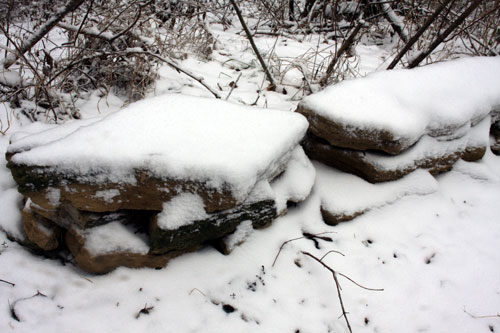
A quiet bench for a moment of rest during a February hike.
(*photo
credit)
February 15, 2010
Woe to the Rich
But alas for you
who are rich; you are having your consolation now. Alas for you who have your
fill now; you shall go hungry. Alas for you who laugh now; you shall mourn
and weep. Alas for you when the world speaks well of you! This is the way
their ancestors treated the false prophets. (Luke 6:24-26)
Woes are harder to
administer than are blessings. With a blessing we extend God's goodness to
others who may be less fortunate. The "woe" is a potential blessing for it
affords an opportunity for someone who is on the wrong track to stop and
redirect his or her steps. We say woe to those who are not restless but
satisfied in their own affluence. We may ask whether they have their fill, and
they will reply in the affirmative -- but is this truly sufficient or do they
fool themselves? If we are satisfied when millions and billions are hungry
today, then there is something wrong with us. That is a wrong satisfaction.
Why a woe? The woe
is a wake up call, a demand that another pause and think what is happening. The
message of Good News is meant for everyone, but a failure to give the total
message could lead to the loss of a few, and we do not want this to happen in
any way. Salvation is for all and thus we address ALL, the poor and the rich.
If one is not doing the right thing, that person ought to be addressed -- and we
need to work with those who affirm "woe" in a more meaningful manner. These can
distinguish between unjust business as usual and what needs to be done by
bearing witness.
It would be
impossible to expect miracles and to await a collective inspiration on the part
of all the world's wealthy -- an extraordinary miracle. For the wealthy may
excuse themselves and say their wealth is a temporary stewardship, but with
friendly governmental statutes they can designate "legitimate" heirs who will
continue the practices of the wealthy long beyond their passing. Large gifts
given become expressions of power by multi-billionaires. The wealth given
should not have been accumulated in the first place. Such giving may be highly
publicized, but still ever higher percentages of economic wealth are
concentrated in fewer hands -- and all democracy suffers.
Citizenship involves
our assisting in liberating the wealthy of ill-gotten gains. Progressive forms
of taxation must be made effective. False prophets bless materialistic gain;
good prophets gain essential materials for those in need. The authentic prophet
must help with human liberation; this involves shaking people from their
affluence, and making them ever more willing to share with others. Arguments
are similar to those of the eighteenth century against absolute and often
despotic monarchs. Woe to the wealthy!
Prayer: Lord,
sweep away the dark clouds that hide from us the poor of the world; make us see
them as people in need and ourselves as people who are in spiritual need of the
chance to share with them and to
become one with them.
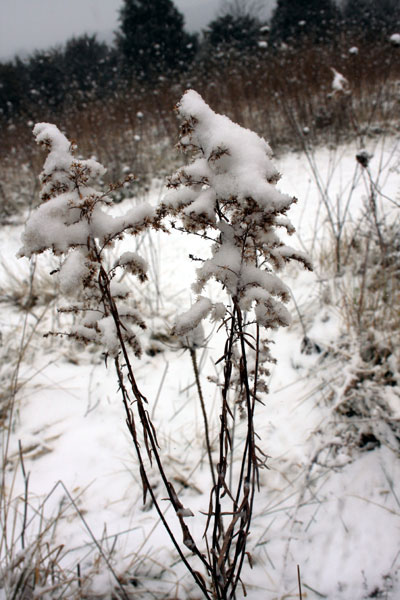
Goldenrod stands tall during snow squall.
(*photo
credit)
February 16, 2010
Shrove Tuesday and Meat Consumption
The concept of
"Shrove" Tuesday deprives from the period to confess sin and has old English and
Germanic roots. The exercise was and still is a private individual practice
that has its benefits as we prepare ourselves for Lent. However, Americans
ought to consider annual per capita meat consumption from 1950 to today (Chicken
21 to 87 pounds; turkey 3 to 17; beef 44 to 66 but pork dropped from 65 to 51,
with total livestock intake going from 144 to 222 pounds today). Isn't this too
high? Climate change is directly related to livestock production to some extent
and to hold to a goal of only a two-degree centigrade temperature rise in this
century. We need to curb resource use and a good start is to reduce meat
consumption.
As farm youth, we
butchered our own pork and chicken and later beef. Our consumption approximated
300 pounds of meat per non-infant family member -- a sizeable amount even for
folks who considered meal and meat to be nearly synonymous. But meat eaters and
others can change, and often for the better. I am not a vegetarian and do not
buy meat; I have reduced meat consumption to less than 2 pounds a month (from
donated sources or shared meals).
Resource
conservation: Consuming grain and soybeans directly as food is more
efficient than passing equal amounts through animals to make milk and meat
products. Soy milk takes far less input of agricultural resources than does an
equal amount of milk product from a dairy. The same holds for the production of
farm-livestock meat (not wild game or domestic livestock that would forage off
unimproved land). However, running cattle on unimproved land can have
detrimental environmental effects as well.
Solidarity:
The anger at the start of the December Copenhagen Conference swelled up among
delegates from less-developed nations with a beginning proposal to cut wealthier
nations' energy consumption in half and then cap the developing nations at half
those consumption rates. True solidarity means radically sharing resources and
finding security through non-military means.
Economics: By
comparing nutrition unit-for-unit, we discover that meat products cost
more and strain the limited budgets of lower-income folks. Meat substitutes are
economic alternatives.
Health:
Reducing meat consumption can be good for the health when we find that balanced
vegetarian substitutes for animal products can be healthy and better for the
heart.
Prayer: Lord,
we confess that we could reduce meat consumption for a number of good reasons,
and this becomes the perfect season to reflect on changing patterns of diet,
something that all of us ought to consider. Help us find ways to reduce our use
of some animal products. Make us see this Lent as an opportunity to explore
ways to limit our consumption of resource-rich foods.
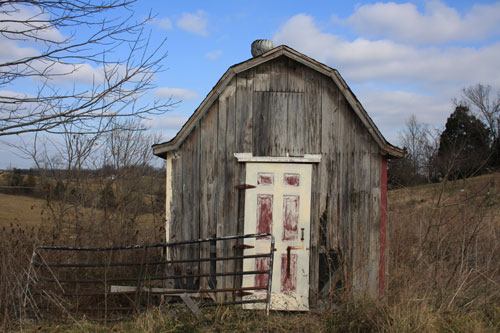
Weathered barn against winter skies.
(*photo
credit)
February 17, 2010
Remember That We Are Dust and Ashes
They will throw
dust on their heads, and roll in ashes.
(Ezekiel 27:30) (also Jonah 3:7)
On this day, Ash
Wednesday, we confront our mortality, our stance before God, and our ongoing
relationships with our fellow human beings. On Ash Wednesday the familiar
markings of dust on foreheads make us all aware that the Christian season of
Lent is starting, a time of extra reflection and mortification. Colorful Mardi
Gras celebrations yield to somber purple Lent.
In various ways
"dust" is a pollutant, a nuisance, an embarrassment, a challenge demanding
attention. Yet at times dust has value: the wind-blown dust (loess or fertile
loam) that settles and fertilizes certain landscapes; the dust from graves
regarded as first class relics by those who respect the dead; the dust of mortal
remains. We are made from and into dust, and this gives us pause as to how dust
enters into our own life cycles. We discover that watered dust can be the
springboard of life.
Ashes have value
(February 21, 2007) as signs of:
* Penitence --
In both Old Testament and New Testament times, ashes and dust were the signs of
repentance and a humble stance before God. In fact, up to midway in the
Christian era the dying individuals were laid on sackcloth and sprinkled with
ashes as a reminder of their condition before the Giver of all life;
* Subservience
-- The vanquished was adorned in sackcloth and ashes before the conqueror;
* Mortality --
Ashes remind us how fleeting is our life. We are called to this fact during
Lent with the words that accompany the imposition of the ashes on the forehead.
* Cleansing agent
-- Homesteaders percolate water through ashes to leach out alkaline (lye)
ingredients for making soap. Pure ashes can clean oily fabrics.
* Fertilizer --
Wood ashes are scattered on the garden or other growing location as an organic
supplement that adds potassium and trace minerals. The ash is alkaline, and too
much would raise the pH beyond the range optimal for most vegetables. Through
ashes comes forth new life.
* De-icer --
Ashes are considered better than salt as a substance to put on paths and
roadways for traction in icy times. However, sticky ashes can be tracked into
buildings.
* Cutting agent
-- In seeding an area with very small seeds farmers often mix the seeds with an
abundant supply of dry ashes, which affords a more even dispersal on the field
or plot.
* Triumph --
In the sport of cricket the winner holds up a trophy that contains ashes,
perhaps originally signifying that the loser has been vanquished.
Prayer: Lord,
teach us to remember who we are, made from dust and yet more than dust and
ashes. We are made to your image and are people on the dusty
road to You.

The mourning dove, Zenaida macroura.
(*photo by Sally Ramsdell)
February 18, 2010 Celebrate the Mourning Doves
One of the great
mysteries of my life is that people would ever "hunt" a mourning dove. How
could you do such a thing? What is manly -- or womanly -- about killing a dove,
have you ever heard of a dove killing a human being? That is sure to give me an
email about a car or plane crash in which an unfortunate dove came through the
windshield.
The mourning
dove's call was first heard this year in a very distinct way. I used to
think that the dove call was a February harbinger of spring (February 8, 2007),
but with the effects of global warming we find that it is now a January call.
If we search a little deeper, we may discover that the dove is calling us to
beware of both good and bad effects of any climate change that is surely upon us
-- and will be even more serious if steps are not taken in light of the
Copenhagen difficulties several weeks back.
The dove pairs
have a love and fidelity to each other. We find them along the road
hunting, hurrying about, and gathering food together. Cooing together is that
sign of love as found in the Song of Songs -- and the turtle dove. This
seems to be a match where the parties need to work together throughout the
operation.
The dove is not an
exotic bird, and so is a simple gift from the Creator to us. In times past,
poor folks presented doves as a sacrificial offering in the Temple; Mary and
Joseph offered these birds at the formal presentation of Jesus. In some ways,
the dove symbolizes simplicity and presents itself as a gift worthy of being
offered back to God.
The dove is
a sign of peace. We recall that the dove brought back the olive branch to
Noah and the ark community as a signal that the flood had ended. The dove
together with many other birds and living creatures reminds us that we need to
have peace with all creation and not make war against Earth herself.
The dove can bring
rejoicing. Yes we are preparing for Lent but are asked to rejoice for the
Easter that is to follow, and so mourning is short-lived as we learn from this
dove. We know the sound of weeping but such can be for sorrow or joy -- or a
combination of both. Cooing can sound mournful or joyful according to one's
interpretation. Thus a true celebration has the elements of what has passed
before, and of what is to come.
The mourning dove
triggers us to act. Spring is now before us and there is work to do. The
dove teaches us to celebrate in little ways so that we can have a longer-term
celebration later.
Prayer: Lord
let each creature be our teacher, and allow us the precious time to reflect upon
the quality that each has to offer us, so by being enriched in simple things, we
are better able to embellish the Good News we give to others.
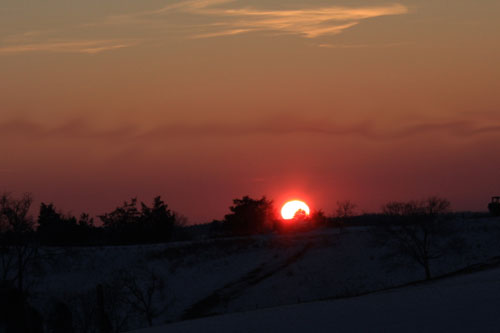
Warming light of a sunset.
(*photo
credit)
February 19, 2010
Is There a Garlic Bubble?
In 1636-37, a
gigantic financial "bubble" developed in Holland over the price of tulip bulbs,
one of many capitalistic bubbles (stock market, dot-com, etc.) springing up,
down to our day. Tulip prices rose precipitously; more people wanted to gain
wealth by trading in tulips at outlandish prices and profits. Greed caused a
stampede. Finally, someone, perhaps a child, said, "Wait!" "Why the panic?"
Prices imploded and tulip-holders lost their shirts.
The recent garlic
bubble in China (the world's major garlic producer and user) proves either
history's repetition or simply gullibility. The 2008 drop in garlic prices
caused underplanting in 2009; the H1N1 flu surfaced and garlic was considered
protection; suddenly institutions wanted truckloads of a scarce commodity, and
prices were multiplied by forty. Jinxiang, China's garlic center, witnessed
simple growers making instant fortunes, and the word got around quite quickly.
Medicinally, garlic
is almost as popular in China as ginseng whether the garlic is taken fresh or
cooked. Galen called garlic the "cure-all;" it has been regarded as an
antibiotic and a remedy for fungal infections, digestive disorders, chest
problems, yeast infections, therosclerosis, thrombosis, hypertension and as a
blood sugar regulator, to name but a few uses. Many claims are disputed
including the reduction of bad cholesterol (LDL). Garlic does contain many
healthy ingredients such as Vitamin B1 (Thiamine), B2 (Riboflavin), B3 (Niacin),
and C, along with essential traces of selenium, zinc, potassium, and phosphorus.
People swear by
garlic (Allium sativum), the "stinking rose," a close relative of the
lily and onion families. February is the time we detect new life among the many
wild garlic plants that are the first of the signs of new life. Many people
flavor dishes with both wild and cultivated garlic. The pungent cloves are the
sub-sections of the bulb or head that can be dug up from the cultivated garlic;
after the outer skin has been removed, these can be crushed and used for
cooking. However, a milder garlic flavoring is found in the leaves or the
shoots from the garlic root. The ingested garlic when metabolized releases a
chemical, allyl methyl sulfide (AMS), that affects the breath and sweat for a
period of time after being ingested. Non garlic lovers won't eat garlic dishes;
garlic eaters may use fresh parsley or mouthwashes.
Wild garlic is found
virtually all over the planet, not just in every lawn but also in all places
with the exception of Arctic regions. Its ubiquitousness leads to widespread
recognition. Garlic is a perennial; garlic is a widely-liked seasoning. Often
people use garlic as a cheap form of dietary supplement and even regard it as a
way to ward off evil spirits. However, with all its qualities it did not
succeed in halting a Chinese bubble stampede.
Prayer: Lord,
teach us to use the things of Earth in such a fashion that we learn
moderation in their use and commerce.
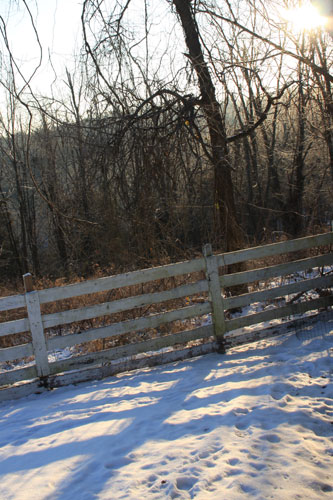
Shadows in the snow.
(*photo
credit)
February 20, 2010
Observe Brotherhood and Sisterhood Week
Be compassionate
as your Father is compassionate. Do not judge and you will not be judged
yourselves; do not condemn, and you will not be condemned yourselves; grant
pardon, and you will be pardoned. Give, and there will be gifts for you: A
full measure, pressed down, shaken together, and running over, will be poured
into your lap; because the amount you measure out is the amount you will be
given back. (Luke 5:36-38)
This coming week is a
perfect time to consider the size of our "family." Many of us limit family to
those within our household, a few relatives connected by cell phones, or an
outreach to uncles, aunts and cousins who get together at weddings and
funerals. Family means related by blood. Others are committed by some sort of
allegiance and call "family" this broader designation. Others of us need to
extend family to those with whom we show special concern and love. Jesus, when
it was announced that his "family" was outside wanting to see him, swept the
audience with his arm and exclaimed that all who do his will are in his family
-- and certainly included his mother. Let's follow his gesture as well.
Our sense of family
must grow, not diminish, with time as we get older, less energetic or unable to
travel. Spiritually, our outlook to all who are "related" may take on a global
dimension as we begin to acknowledge that a billion people are hungry -- all
individuals with empty stomachs, refugees, those with mental disabilities, the
ones who are in harm's way, and those who are struggling with illnesses. The
Copenhagen Climate Change Conference was a teaching moment that all, rich and
poor, are one challenged family who must work together to save our planet.
Extending the sense
of family can be combined with the power of prayer. The compassion of Christ,
shown to us on Calvary through his suffering and death, is now extended in space
and time through each Divine Liturgy. It is our Liturgy, the work of all the
people. When some do not come, we not only miss them; their absence is sorely
felt by a compassionate community and the reasons that cause them to stay away
become a painful event in our collective lives. We will not look down on those
who come; we will be painfully mindful of those who are absent.
As part of the family
we enter into the sufferings of others and pray for them with compassion.
Jon Sobrino, a Jesuit survivor of the El Salvador university massacre in 1989,
challenged us that in all we do we either crucify Jesus in the 80% of the global
marginalized population, or we "take Jesus down from the cross" by accompanying
the marginalized in their struggles for a decent existence. Lent becomes a
family time, when we truly ask how widely we extend our family. We need to
learn from people who choose to give quality time to their families.
Prayer: Lord,
teach us to know our family and their needs and resolve that our bonds of
fellowship may become more intensive.
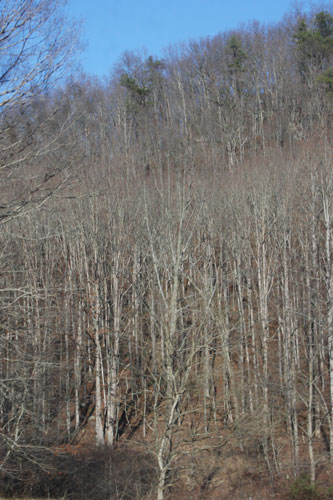
Hillside near the Mary E. Fritsch Nature
Center - ASPI
Rockcastle Co., KY.
(*photo
credit)
February 21, 2010
Confront the Temptation to Refrain from Acting
DON'T! DO!
Well which is it? Words can be caution signs that something terrible will
happen just around the corner. Generally we make this first Sunday of Lent the
time to hear about all the things we could do wrong, and so the "do nots" take
precedence (do not steal, bear false witness, fight, etc.) What we are not to
do makes us feel after a while that a frozen position is a proper model stance
in the world around us. Do nothing! But is that right? If we fail to act by
denying the need or excusing ourselves or escaping from the responsibilities, we
are sinning by failing to act, in other words, by refraining from acting.
We look to Jesus to
see us through our temptations and yet he realizes that his upcoming ministry
will involve acting: healing, teaching, and proclaiming the word. He refrains
from using material things to achieve success and fame and power. Jesus'
security is in the Father's hands and not in material wealth; his power rests on
a moral authority coming from a good life; and his fame is to obey the Father in
all things even in his shortened ministry, in his suffering and in his death.
Jesus is tempted to
turn stones into bread because he is hungry. Jesus uses the Deuteronomy quote,
"Not by bread alone." We also are tempted to find
security in material things. We seek such security in insurance policies, in
job security, in material conveniences. The more we obtain, the more we seem to
need, and soon a sense of poverty in spirit gives way to the insensitivity of
possessing an overabundance of material things.
Jesus is tempted to
receive all the power and glory of the kingdoms of the world, if he but gives
homage to the devil. Temptations to manifest power over others, especially in a
nation that knows itself to be a current superpower, affect us all in many
ways. We can be consumed by the emerging powers that are within us to command
and control our own lives and those of others. The temptation is to think that
we can bring about good by acting unilaterally. Power without some checks and
balances corrupts us. Instead of some type of visions of grandeur we are to be
single-hearted and chaste in our quest for God; before God alone do we fall down
and worship; only in God do we trust.
Jesus is tempted to
throw himself down from the temple parapet, for the angels would come and save
him. He is tempted to create a dramatic entrance to his public ministry and one
in which others would be overwhelmed by his majesty and treat him as a notable
personality. We are tempted to fame and personal glory by being better than
others and outdoing them as number one, shining at others' expense, and being
looked upon in admiration. But this is not God's way and we, like Jesus, are to
be obedient to God's will on every occasion in our journey of faith.
Prayer: Lord,
teach us to see temptations for what they are, to act even when at risk, and to
trust in your mercy when we act.
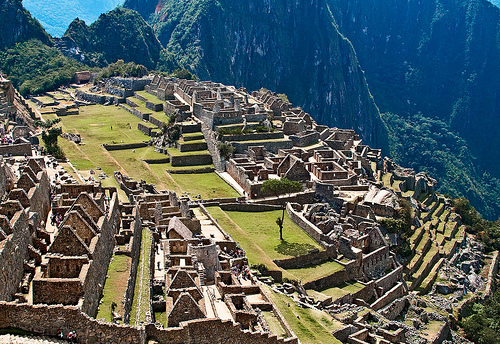
Machu Picchu from above.
(*photo by
Pedro Szekely, Creative Commons)
February 22, 2010 Consider
Our Cultural Commons
On
George Washington's Birthday, we realize that America has a
cultural history that includes Mount Vernon and a host of historic
and archeological places worth respecting and preserving. At times,
petrographs on rock formations and caves in our region have been
desecrated by chipping or spray painting.
Local,
regional and national protection ought to extend to the global
heritage sites, since these are part of a "commons" that is a
worldwide legacy. Tourists ought to have only limited access to
sensitive guarded sites (e.g., King Tut's burial site is
deteriorating). A host of cultural treasures need protection:
pyramids in Egypt, the Sistine Chapel, Machu Picchu in Peru and the
Taj Mahal in India. High profile global treasures ought to be
internationalized as to protection and maintenance support. With
increased mobility it is all the more imperative to protect major
ancient cultural artifacts and historic sites from poachers, relic
hunters, air pollutants, and natural calamities.
Merely
designating an unprotected site as culturally significant can invite
damage. After being described in the media, a 6,000-year old cave
painting in western Africa was ruined by spray paint. European
conquerors and thieves took ancient artifacts, parts of the Greek
Parthenon, many Middle Eastern columns and memorials, and even parts
of the Egyptian pyramids. In the past the wealthy and powerful
considered themselves entitled to loot with a colonialist-type
justification. Looted treasures ought to be returned to nations of
origin.
A recent trend is
that the children's world of games, fairy tales, nursery rhymes and
songs has been privatized by entertainment companies -- even "Happy
Birthday" is copyrighted. Among the stories that Disney has come to
control beyond Mickey Mouse and Winnie the Pooh are the ancient
tales Robin Hood, Sleeping Beauty, Hunchback of
Notre Dame, Davy Crockett, Beauty and the Beast,
Cinderella, and Snow White. Incidentally, no Disney
stories have entered the public domain. Private cultural heritage
ought to be in the public domain.
On January 21,
2008, Marie Smith, the last speaker of the Eyak language in Alaska,
died; a last-of-a-language death occurs about three times a month.
The UN reports that, at current rates of disappearance, within this
century half of the seven thousand languages of the world will
vanish -- three per month. Native speakers die and their offspring
prefer to use the major language of the area. Cultural heritage and
expression are a threatened and endangered species. National
Geographic, "A World Loses Its Tongues" (Oct., 2007) has a map
showing the most threatened areas. The Living Tongues Institute
for Endangered Languages, a National Geographic project,
ought to be supported.
Prayer:
Lord, teach us to work for the protection and support of significant
cultural treasures and expressions.

Poppy from a summer's garden.
(*photo
credit)
February 23,
2010 Is the Afghanistan War Justified?
On
this Peace and World Understanding Day we must ask some
searching questions with respect to the wars now being waged. Just
war theory has been argued for many years, and President Obama
escalated a war and collected the Nobel Peace Prize all in one
week. Those of us who listened to President Obama's speeches in
December wondered whether we can concede that such a theory is still
justified in this modern age. From the time of Cicero and since St.
Augustine of Hippo, various conditions for such a war have been
proposed. Are all conditions for escalating that war being
fulfilled? Is the current approach the only one, and is it
influenced by the military/industrial complex?
The Catechism
of the Catholic Church says the gravity of such a decision makes
it subject to rigorous conditions of moral legitimacy:
* the damage
inflicted by the aggressor on the nation or community of nations
must be lasting, grave, and certain;
*
the other means of putting an end to it must have been shown to be
impractical or ineffective;
* there must
be serious prospects of success; and
* the use of
arms must not produce evils and disorders graver than the evil to be
eliminated. The power of modern means of destruction weighs very
heavily in evaluating this condition.
No
one doubts that terrorist acts were committed originally, but a
small group of terrorists possibly operating in an extremely remote
territory may not justify inflicting total war on people. Certainly
other means could include training groups to subvert the terrorist
organization or taking measures that would not demand war's
escalation. As for serious prospects for success, we recall that
Afghanistan has never been conquered in the long-term, and to expect
success in this time is foolhardy to say the least.
The final
condition is not to cause harm graver than the evil to be
eliminated; modern weapons are causing considerable civilian injury
and death -- and that is grave harm.
William
Pfaff, author and political commentator, argues that the ultimate
purpose of the Taliban and al-Qaeda is to bring about an upheaval in
the Islamic world, in order to rescue Islam from corrupted
governments and degenerate practices. He thinks the West is drawn
into being provoked (through homeland attacks), in order that we
send in more troops and build military bases; this ensures that the
occupied people are radicalized and scandalized, and they turn
against their own cooperating governments. For him, the West is
playing directly into the hands of al-Qaeda. The conditions for a
just war are lacking and reasons for troops being in Afghanistan are
problematic. I do not think this war is justified.
Prayer:
Lord, we pray that our country takes quite seriously the conditions
for a just war and selects non-military solutions to the current
conflict.
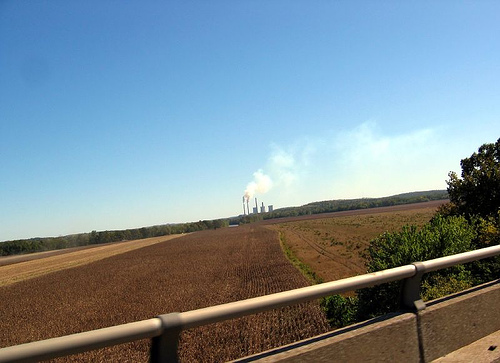
Muhlenberg Co., Paradise, KY.
(*photo
credit)
February 24, 2010
Make Fossil Fuels Transitory Energy Sources
Each
day, the 110-car coal trains in a railroad switching yard right
outside my window remind me of what drives the economy in this part
of the country. Coal is regarded as cheap (not paying all
ecological costs) and is the main export from this region. Few
question its current place. However, some of us are now concluding
that this coal is an intermediate fuel between formerly-primary fuel
wood and future renewables. However, if we are to waffle and tarry
over the long-term move, we could spell irreparable harm if not
destruction to our wounded Earth. We have some problems:
The International
Energy Agency says that the rise (especially in China, India and
other emerging nations) of fossil fuel use is so great that we can
expect that renewable energy will lag behind fossil fuels during the
next two decades. There are simply not enough wind turbines, solar
panels or hydropower sites to meet the upcoming demand through the
year 2030.
Coal
will contribute 44% of the fuel in 2030 in comparison to 41% today.
It all comes down to what will continue to be "cheap" when users
neglect all the many environmental costs. It is like feasting on
cheap but non-nutritious subsidized fast food; it is not good for
us, but it costs less than other types of food.
People
have been sold on the hokum that the coal emissions can be
neutralized or completely contained by some sort of carbon dioxide
capture. "Clean coal" is a myth, and to make the burning less
polluting would require an immense outlay of remedial resources,
which we cannot expect China, India or even the United States to be
quick to install.
Those
of us in coal and fossil-fuel-dependent areas find ourselves in a
bind. To remain silent is wrong; to speak brings down anger and
outrage as though we are being totally disloyal. However, we can
refine a message to show pro-regional sentiments in several ways.
First, our region can become more of a tourist destination if coal
production is curtailed; we can install a limited amount of
renewable energy applications to replace coal; we can make our
region a haven for retirees, especially the large number of
expatriates who would like to return to their roots.
Perhaps
our dependence on fossil fuels is temporary, and we still have
precious time to make meaningful changes to a renewable energy
economy. Coal dependency must yield to other types of livelihood.
We need to see the immense value of our mixed mesophytic forest, the
oldest and most varied temperate hardwood forest in the world. This
resource needs to be preserved as a natural sink for the excess
carbon dioxide -- and just as poor lands deserve subsidy from
wealthier ones, so does our region.
Prayer:
Lord, give us the courage to speak out even to those who are near
and dear and to begin a process of making changes that will reduce
the danger to our planet Earth.

Dandelion and shadow.
(*photo
credit)
February 25,
2010 Glory in the Lowly Dandelion
It
is not too early to think of dandelions (many of which are regarded
as pesky weeds by many lawn lovers). Certainly this alien from the
Old World has comes to thrive in our part of the planet. However,
even though the dandelion has long been naturalized, for me this
lowly plant is a favorite edible vegetable/flower worthy of
respect. For one thing, I have found blooming dandelions (often in
hidden and protected places during winter) every month of the year.
The delicate scent of the bloom always elevates my spirit.
The
green portions are excellent late winter (in milder climates) and
early spring greens. During the Civil War, Confederate soldiers,
pressed with food shortages in the waning of their cause, would
gather and eat dandelions, which are rich in vitamins and minerals.
To me the early messes of dandelions are wonderful when wilted with
vinegar and hot oil (my mother used bacon grease) and served with
chopped onions, boiled eggs and potatoes, and a dash of sugar, salt
and pepper. Also dandelion makes a wonderful addition to many
different cooked greens and soups (see Special Issues).
The
root can be dried and crushed to make a reasonable herbal drink, and
the flower is known to be made into a wine, the quality of which
depends on the skills of the wine maker.
My local Jesuit
superior, Walt Bado, has allowed us to reproduce his insightful poem
here:
Dandelions
Golden
asterisks on emerald grass,
Fuzz-balls, seed-filigreed, alas!
For
botanists, plant-genus Taraxacum,
For
weeders like me, pain in the apoplexum.
The
leaves do make a handy salad, though;
The
flowers, a dandy brandy. So,
Weeders
of the world, if we can't beat 'em,
Let's
eat and drink, enjoy 'em!
Prayer:
Lord, help us to see the simple and lowly creatures below our feet
as resources for our own learning, utility, and aesthetical
yearnings. Give us the continued opportunities to proclaim to
others what so many overlook and take for granted in their
often-defined routine lives.
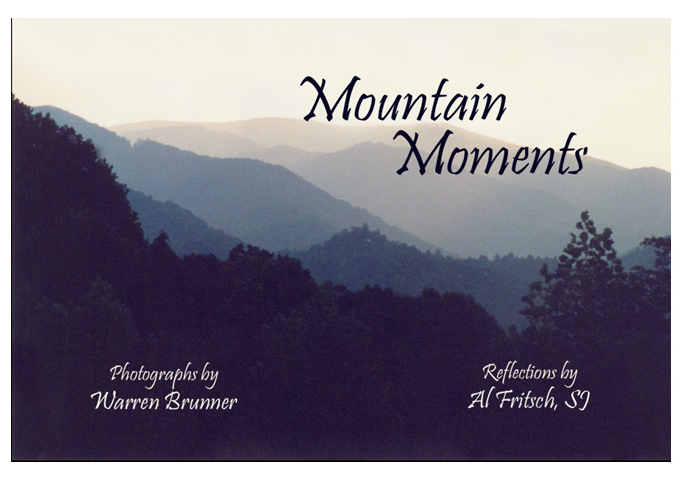
Cover for "Mountain Moments" (click
here for information).
(*photo by Warren Brunner)
February 26,
2010 Prepare for "Mountain Moments"
By mid-2010 a
coffee table book of about three hundred colored photos will be
published by Acclaim Press, a group known for full size photography
books. This publication, principally by Warren Brunner and his
three-generational clan (along with my text) has been a two-decade
work of love. Right now Warren's vast photo collection is being
tapped to obtain the best colored photos of mountain scenes,
representing a lifetime of hard and creative work.
This
book promises to be an ideal gift for people who have left our
region but want a remembrance of the good times and events among our
friendly mountains and communities. Those who hear of this book
will have an opportunity to purchase an ideal gift for special
anniversaries, birthdays or holidays -- or simply to be nice to
those who are recovering from an illness or other burden.
---------------
Mountain Moments
The
Appalachian Mountains influence us in many ways and, in their own
way, help raise our hearts and minds to God. Also they are able to
change the way we live and think about ourselves and others.
Mountains have their own characteristics and when we live among
them; these good attributes help make us better for being here.
This interaction of land and people is worth reflecting upon and we
are convinced is worth passing on to others.
We seek to
demonstrate the ABCs of just some of these mountain characteristics
through photographs and accompanying reflections and prayers. We
suspect that we have only tapped the surface and that deep within
the recesses of our hills are many other wonderful characteristics
that are awaiting discovery. Our invitation is that you attend to
the mountain moments of your own lives and help us uncover the
spiritual wealth that is forthcoming. We would like to know your
own thinking on this subject.
Warren Brunner & Al Fritsch, SJ
For a limited
time, the price is $29.95, a pre-publication bargain that we hope
our readers can take advantage of through our Earth Healing
website. For further details visit the publisher's website:
Acclaim Press
12267 State Route 135
Marion, Kentucky 42064-5656
(www.acclaimpress.com).
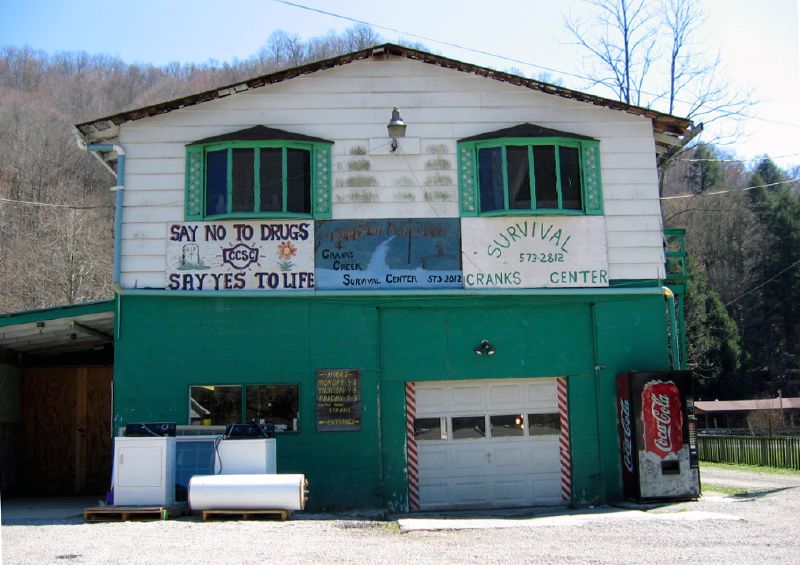
Cranks Creek Survival Center (Becky
& Bobby Simpson). Harlan Co., KY.
(*photo
credit)
February 27, 2010 Encourage
Agents of Change
The
landscape is preparing to change dramatically with the approaching
spring. Our hearts are gladdened but does this always accompany
upcoming change? Do we welcome changes when people mature, grow
old, leave home, acquire new interests, or retire? For the most
part "changes" get mixed receptions, some we greet and some we
prefer to ignore. Change is inevitable and thus we must learn to
live with it, accept it, and direct it to improved stages when
possible. Thus, our focus ought to be on being and helping others
to become good agents of change.
Some
people make great agents of change: founders of religious
communities, artists and influential writers, inventors and
explorers. Alexander the Great learned from his father, Philip of
Macedonia, that military success did not depend on numbers only but
on striking at the heart of the foe and getting the leader early in
the struggle. This is the reason he was able to win the battle of
Issus in 333 B.C. with an army only one-fifth the size of the army
of the Persians under Darius III; and it resulted in subsequent
brilliant victories as well. Military changes are dramatic, but not
necessarily the most profound type, for victories and empires are
passing. In fact, incremental changes through the evolutionary
process have a drama all their own even though immediate witnesses
may be absent. We ought to focus on the agents of smaller, but
nonetheless profound, changes in our world.
Changes
are good when well-directed. The one who fails to accept the need
for change may suffer from a lack of confidence, a debilitating
false humility, and the loss of a golden opportunity. Authentic
agents of change perceive opportunities, are positive about the
talents of others, and are sympathetic to those reluctant to take a
major step: a move, a job, an enrollment, a new social outlook.
This agent of change is really a catalyst, not the decider but the
one who influences the decision-making process along productive
lines -- for some may need the creative space to reflect and discern
before a major decision.
Challenge
the reluctant change agent who tends to measure himself or herself
in comparison with people of different talents. "I can never be a
good musician" may be an honest admission that this is not what lies
ahead for the person. Maybe they are not as talented in one pursuit
as is their model of measurement, but they are talented in other
ways. This moment of agitation and self- doubt can be a negative
insight. "You are right; you are not meant for this; consider
other possibilities." The true agent of change facilitates the
decision-making process by individuals or by communities -- and may
remain apart from the decision itself. A catalyst remains apart
from but still enhances the process.
Prayer:
Lord, give us the insight and generous spirit required to see change
ahead, discover agents of change, and encourage them to act.
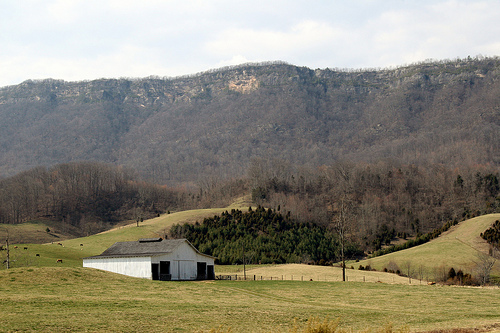
Farm near Cumberland Gap National Historical Park.
(*photo
credit)
February 28, 2010 Reveal
God-Given Opportunities
Sir,
leave it for this year also, and I shall cultivate the ground around
it and fertilize it; it may bear fruit in the future. If not, you
can cut it down.. (Luke 13:8-9)
In
today's parable the servant begs the landholder who wanted to cut
down the unproductive fig tree, which has not borne fruit in three
years, to give it one more chance to be productive -- and the
petitioning servant is willing to assist by fertilizing and
nurturing the plant. In some way, this kindness is also what God
shows to each of us by giving us individually and collectively
additional opportunities to change our ways and improve.
Furthermore, we become other christs to our fellow human beings by
becoming the servants who fertilize and encourage change leading to
a fruitful life.
Individually,
each of us needs these opportunities all too often, lest we simply
sink into the ruts of our lives. Let us not forget from this
parable that it takes another to help afford the opportunity to be
productive. Our second chance is a community endeavor, not solely
an individual acting alone. God affords us additional time and space
to make the changes and really acts as the servant as much as the
landowner. Likewise, we who work through grace are those looking
for change and yet also willing to take the extra step to give
another opportunity. Those who seek to abolish the death penalty so
that the convicted can have another chance in a productive life
(even while in prison) are servants for the second chance. Some
strive to touch the lives of those who are overdrugged and seemingly
hopeless. Others try to educate those who feel worthless or people
without hope. Still others want the illegal migrant to be given
another chance.
Collectively,
much the same pattern as just mentioned is part of God's mercy and
care for communities, peoples and the entire human family. As
responsible citizens, we become the God-given opportunity to change
the way we live as local communities, regions, nations and the
community of nations. Wasteful use of resources in the past is a
sign of sterility and unproductiveness. Now the world needs us to
be servants willing to fertilize and nurture, to abandon wasteful
luxuries, and to share in a radical manner with our suffering
brothers and sisters in other lands. If we do not seize the
opportunity to be servants to and for them, entire island nations
can be swallowed up by rising oceans and ultimately the poverty of
sufferers will extend to our own doors. God gives us opportunities
to convert as a people from economies where natural resources are
undervalued to ones where all have a chance to live quality lives in
a sustainable world. God's mercy and compassion are what holds back
a wrath that could easily come. However, if we see our way in this
Lenten season, we become the opportune moment and place when and
where change is possible.
Prayer:
Lord, help us to see that You are quick to give us one more
change; inspire us to share Your patience with others. |